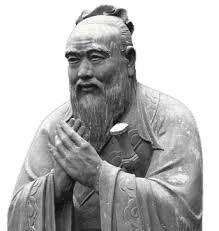Life and achievements
Early life
Confucius was born during a period of Chinese history characterized by social disorder and political disintegration. His childhood was not very comfortable, as his father, a local military officer, died when Confucius was still a toddler at the age of three. His mother raised Confucius, encouraging him to learn more and improve. Despite the challenges, he received an education focusing on the "Six Arts": ritual, music, archery, chariot driving, writing, and calculation.
At 19, Confucius got married and started a family of his own, but he did not stop searching for knowledge and improvement in his character. He was an intellectual and a man of principles, which made him liked by many people who followed him. Before he was 22, Confucius opened his school and imparted knowledge on ethical and moral values in leadership and society. He stressed the principles of ethics and the part that learning plays in the development of an individual and culture.
Confucius's early life was characterized by holding various insignificant posts in the government; however, his candid opinions made him an undesirable figure for the ruling class. Still, he never gave up on the idea of a righteous and just society. He did not give up on teaching and continued to teach. Finally, he got a group of people who followed him and continued his work.
Legacy
Confucius left an enormous influence beyond the period of his life and the area he lived in. He laid the foundation of the Chinese education system, government, and society, hence, his teachings. Based on Confucian texts, the civil service examination ensured that the government officials were chosen based on their knowledge and character, not their status, thus encouraging meritocracy.
Confucianism affected China, Korea, Japan, and Vietnam, as well as their cultures and societies. Thus, values such as respect for parents and elders, obedience to authority, and maintaining social order became essential features of these societies. Confucius's ideas also found their way into the Western world and thus formed part of the global philosophical platform.
Today, Confucianism is still very influential, especially with the renewed interest in the ethical and political ideas of the Confucian tradition. Confucius is considered one of the most influential philosophers of all time, and his philosophies are admired and followed even today. His focus on ethics, knowledge, and harmony is still relevant for anyone who wishes to become a virtuous and wise person and for societies that want to become a better place.
Milestone moments
Sep 9, 551
Birth of Confucius
Confucius was born in Lu during the Spring and Autumn periods of China.
His childhood was relatively poor, especially after the death of his father when Confucius was only three years old.
However, Confucius's mother ensured that he had the best education despite the difficult conditions they faced in their society.
Oct 2, 500
Appointment as Minister of Crime in Lu
Confucius was made the Minister of Crime in his home state of Lu.
In this role, he introduced measures that he thought would enhance justice and moral leadership in society despite the opposition of some influential nobles.
Oct 16, 497
Exile from Lu
Because of political rivalry, Confucius was expelled from Lu and moved from one state to another in China for the next few years.
While in exile, he continued teaching people, sharing his philosophy, accumulating disciples, and developing his doctrine.
Nov 7, 484
Return to Lu
Confucius went back to Lu at the age of 68 when the state called him back.
He devoted the last years of his life to writing and teaching, and his disciples documented his philosophies in the "Analects."
